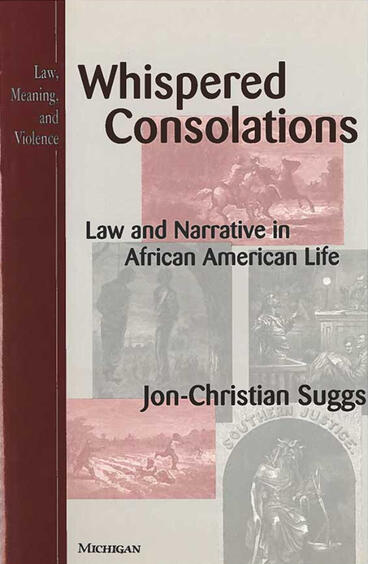Whispered Consolations
Law and Narrative in African American Life
Explores the relationship between African American literature and American law
Description
African Americans have experienced life under the rule of law in quite different contexts from those of whites, and they have written about those differences in poems, songs, stories, autobiographies, novels, and memoirs. This book examines the tradition of American law as it appears in African American literary life, from pre-Revolutionary murder trials to gangsta rap. The experience, and the critique it produces, changes our pictures of both American law and African American literature.
This study reads the already canonical works of nineteenth- and twentieth-century black literature in the context of their responses to and critiques of American legal history. At the same time, it examines little known texts of African American life, from the urban humor of James D. Corrothers, through the early political essays of Chester Himes, to the adventures of black comic book heroes like Steel, Wise Son, and Xero. These are contextualized within specific legislation and case law, from the slave laws of early Virginia to the Civil Rights Act of 1964, from the case of Phillis and Mark in 1755 to the Simpson trials of the mid 1990s.
Finally, the legal texts presented are themselves critiqued by the fictions and legal analyses of the African Americans who lived out their implications in their daily lives. Through a positing of the legal and cultural concepts of privacy, property, identity, desire and citizenship, and the romantic ideals of authenticity, irony, and innocence, Suggs is able to show how our understanding of American law should be influenced by African American conceptions of it as depicted through literature.
This book will appeal to students and scholars of literary and cultural studies, law and literature, American history, as well as to scholars of African American literature and culture.
Jon-Christian Suggs is Professor of English, John Jay College, City University of New York.
Jon-Christian Suggs is Professor of English, John Jay College, City University of New York.
Reviews
"Suggs offers insightful readings that demonstrate the legal context of the examined texts and provides ample proof that legal status was a central concern of African American literature during this period. . . . Suggs successfully illuminates the legal context of much African American fiction."
- Richard Schur
—Richard Schur
"Whispered Consolations, an ambitiously researched work, posits provocative possibilities for literary scholarship throughout its eight chapters and, in an extended epilogue, suggests exciting analogues with rap music and comic books."
- Ira Dworkin, City University of New York
—Ira Dworkin, City University of New York, American Literature, March 2001
". . . the first wide-ranging interpretive overview of the intertextual relationships between African-American literature and the law, an ambitious and novel contribution to interdisciplinary legal history. Whereas previous scholars have considered, from a historical perspective, the way in which various features of American literature were made possible by developments within the law (examining, for instance, the relation between intellectual property regimes and conceptions of literary authorship), the nexus of race, literature, and jurisprudence has received far less sustained analysis than it deserves. Suggs fills this gap with a work of broad scope and synthetic energy, applying an interpretive method that draws the fields of law and literature together with special force and does so with a fundamental concern for change over time. . . . Whispered Consolations brings together literary-critical analysis, historical investigation, and a concern with the mutually constitutive nature of law and literature to reinterpret both African American fiction and American legal history. . . . "Given that the question of African American destiny may perhaps be the central story of American history, the one on which the moral meaning of the nation rises and falls, legal history is well served by a study that reveals how interdisciplinary methods can illuminate topics of overarching national and scholarly importance."
- Mark S. Weiner, Yale Law School
—Mark S. Weiner, Yale Law School, H-NET BOOK REVIEW, July 2000
". . . an important and creative study of a distinctively African-American legal consciousness that should be of real interest to scholars and teachers of legal and constitutional history as well as to those more directly interested in the field of law and literature, particularly in relation to the politics of identity in the nineteenth and early twentieth-century United States."
- Martha Merrill Umphey, Amherst College
—Martha Merrill Umphey, Amherst College, LPBR: Law & Politics Book Review, May 2001
"In reading Whispered Consolations one is immediately struck by the breadth of Jon-Christian Suggs's investigation as he examines the exclusionary and exploitative role of law and extra-legal measures in the canonical works of nineteenth and twentieth-century black literature. . . . Beginning by examining the social order of the plantation system and concluding with an explication of the influence of rap music, Suggs illustrates how 'African American desire begins to reemerge in magical visions of nationalism and aesthetics deeply scored by ironic conflicts between the racialization of pathology and the normative impulses of racial pride.'" What distinguishes Suggs's work is the skill and acumen he demonstrates in rendering legal and literary judgments against the historical and culture [sic] background on which texts are written."
- Carlyle Van Thompson
—Carlyle Van Thompson, Review, Volume 24 (2002)
"This book is ambitious, smart, and incredibly well titled. . . . [O]ne of the main contributions of this work is the recovery and criticism of work by some lesser-known African American authors of fiction. . . . Suggs has provided an insightful reading of why words have important social consequences, even if they are only whispered, and even if they are, as he ultimately admits, only small consolations."
- Vanessa B. Beasley, Texas A & M University
—Vanessa B. Beasley, Texas A & M University, Rhetoric & Public Affairs, Spring 2002
News, Reviews, Interviews
Review Law and Politics Book Review | 5/1/2001

